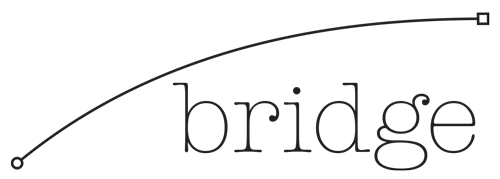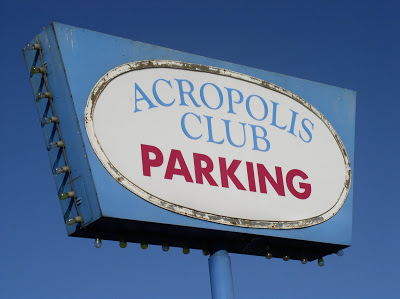Building Bridges, Probing Intersections
Yiorgos Anagnostou
Discussions and debates might not prevent the next big fire,
But how does staying silent help? or preaching to the choir?
What makes you think that anything that most of us could say
To anyone could ever make a difference either way?
…
You never speak with anyone who's not of the same mind,
What makes you think you'll help transform the views of humankind?
–Eric Ball
(https://night-rhymer.blogspot.com/2017/02/2417_80.html)
Bridge offers a platform for writers and readers to cross into a multifaceted terrain, that of “Greek America.” For the purpose of this writing, I refer to Greek America as a wide range of collectives, institutions, organizations, and individuals that cultivate and animate Greek expressions in connection with the United States. These include the following: populations that claim a Greek label in self-ascription (“Greek Americans,” “Greeks in America,” “American Greeks,” etc.) and also in expression—participating or coordinating, for example, cultural events such as Greek film festivals; institutions such as Greek Orthodox parishes, US Modern Greek studies programs, and regional associations such as the Pancretan; or individuals, such as authors, artists, and others–regardless of ethnic background–who explore, either in public or in private, Greek/American intersections.
In Greek America, Greek and American worlds intersect in fascinating and complex ways. A US Greek festival, for instance, intersects with American multiculturalism, as the latter enables the former. An American’s travel to Greece to discover the family’s ethnic past intersects with the emphasis that American modernity places on heritage and roots as a way of battling alienation. Greek America is transnational in that it unfolds within the space of the host society (United States) and the historical homeland (Greece). In this regard, a museum in Greece representing US Greek immigrants and the diaspora, a Greek American studies course in a Greek university, or accounts of “diaspora return” to Greece such as the film My Life in Ruins are all constitutive components of this landscape.
Greek America, particularly its contemporary manifestations, is little understood. The goal of Bridge is to contribute to its mapping through analysis, as well as through the circulation of, ethnographic, autobiographical, and literary material.
Our aim is to foster conversation about issues such as bilingualism or ethnic media in the context of the new US political climate; about policies, such as criteria for scholarships or initiatives for ethnic preservation; and cultural developments, such as the visibility of non-normative identities, all in a public realm that is arguably dominated by narrow representations of Greek America. As I have noted elsewhere, the project of creating a vibrant, responsible, and accessible dialogue about the present and future of this field is long overdue (1). Equally urgent is the task of writing that does justice to Greek America’s heterogeneity, creative impulses, and progressive threads, while also taking into account alternative perspectives.
This forum hosts multiple voices across a wide cross section of social life, including educators, students, authors, scholars, poets, cultural and political activists, novelists, journalists, bloggers, and the general non-academic public. Collaborations between faculty and students or between artists and scholars are particularly welcomed. Issues will range from activism to identity, diasporic writing to cosmopolitanism, folk dances to film, education to representation, teaching to parades, and beyond.
Bridge, aptly titled for this endeavor, builds a forum to reach and explore Greek America’s various intersections, taking us to multiple crossings and linkages. For example: How do Greek America’s narratives of identity connect with US racial structures and dominant ideologies? What are the intersections between ethnicity and class? Or the gravely underexplored intersections between gender and sexuality? Dramatic changes in the US political culture and the place of Greek America in these developments calls for understanding. What is more, diaspora affiliations need to be understood in a transnational context: that is, both in relation to Greece and to the United States.
Bridge, by offering an arc connecting artists and scholars as well as authors and the wider public, hopes to foster a dialogue. We would like to see scholars in US Modern Greek studies entering into even richer, more complex conversations with Greek Americanists. Likewise, interactions connecting the worlds and the words of the academy and those of the non-academic public are paramount. The linking of theory and practice will contribute to this interface. Intergenerational understanding is necessary, and the question of the responsibilities and obligations of leadership is imperative. New lines of communication must be opened and old ones must be renewed between academics and the general public in Greek America and Greece.
Building these effective bridges requires compelling writing in various genres, from autobiographical writing to essay, from position papers to reflective commentary, from visual representation to scholarship, from the short story to the editorial, from testimonial to chronicle. It calls for a sociological imagination, too. The challenge is how to explore Greek America through unexpected routes and to examine it through unanticipated angles—how to enable writing that makes key interventions, stirs public interest, and unveils—it is our hope—new ways of thinking and doing across this terrain.
Acknowledgments: A long conversation with Eric Ball clarified a key intersection in this essay. I also thank Despina Margomenou for an important perspective during the nascent stage of this project.
Notes
1. Anagnostou, Yiorgos. 2016. “Authors, Scholars, and the Public in Greek America: Toward a Conversation.” November 27. http://immigrations-ethnicities-racial.blogspot.com/2016/11/authors-scholars-and-public-in-greek.html

(first published in BRIDGE magazine, 18 February 2017)
Bridge, 18 February 2017
Yiorgos Anagnostou is Professor of transnational and diaspora modern Greek studies at The Ohio State University. His work is interdisciplinary and has been published in a wide range of scholarly journals (for a selective bibliography see, http://www.mgsa.org/faculty/anagnost.html). He is the author of Contours of White Ethnicity: Popular Ethnography and the Making of Usable Pasts in Greek America (Ohio University Press, 2009), now under translation into Greek (εκδόσεις Νήσος, 2017). He has also published two poetry collections, «Διασπορικές Διαδρομές» (Απόπειρα 2012, http://apopeirates.blogspot.com/2012/04/blog-post_20.html), and «Γλώσσες Χ Επαφής, Επιστολές εξ Αμερικής» (Ενδυμίων 2016, http://endymionpublic.blogspot.com/). He is the co-editor of the online Ergon: Greek/American Transnational Arts and Letters (http://ergon.scienzine.com/). He writes for Greek and Greek American media, and occasionally blogs on Greek America (http://immigrations-ethnicities-racial.blogspot.com/), and diaspora poetry (http://diasporic-skopia.blogspot.com/).
Greek America, particularly its contemporary manifestations, is little understood. The goal of Bridge is to contribute to its mapping through analysis, as well as through the circulation of, ethnographic, autobiographical, and literary material.

